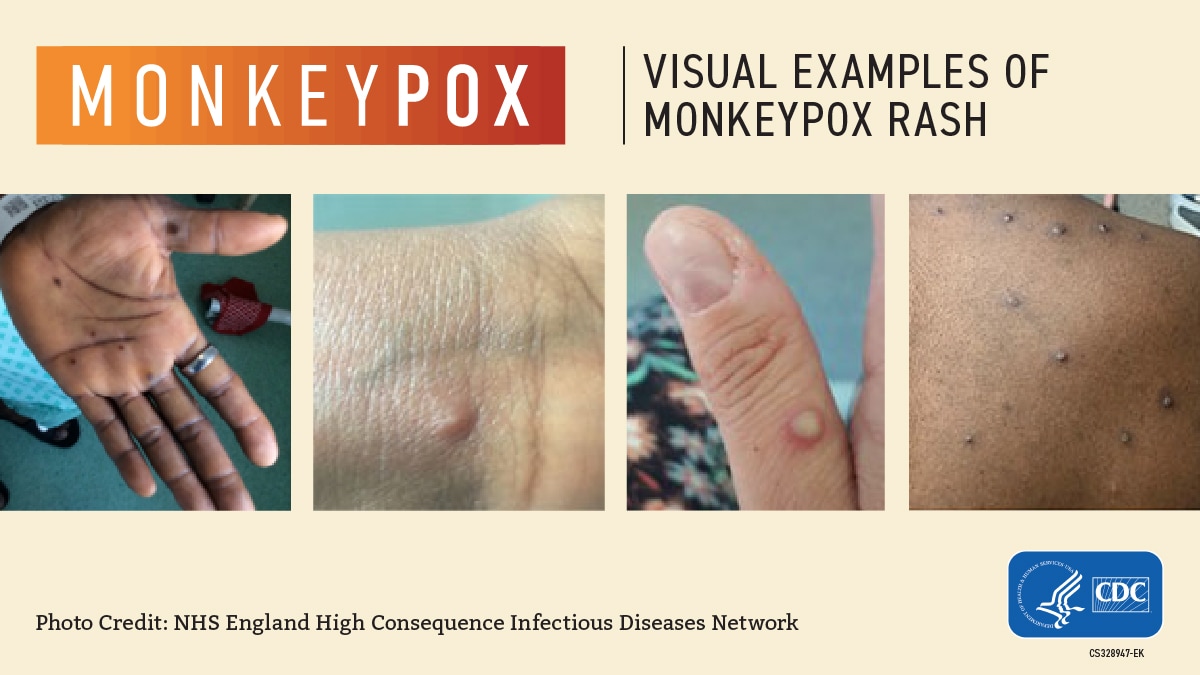Addendum Aug 3rd, 2022:
Read an Updated article on “How Is Monkeypox Spread” by Epidemiologist Dr. Katelyn Jetelina.
Original post:
Here is a summary of what you should know about the spreading virus. There is a lot we have control over with this (usually) mild infection. Over the pandemic we have learned so much about effective contact precautions which will be useful for containing monkeypox as well. Be assured that your primary care team will do our best to keep you updated and as healthy as we can. Thank you for your trust.
-Your BW Primary Care Team
IMPORTANT: If you believe you might have symptoms consistent with Monkeypox, we will offer you a telehealth appointment to avoid putting other patients/staff at risk. We can later arrange for a safe method for sample collection or physical exam.
As of July 18th, there are 46 cases of monkeypox in Maryland. Cases can be tracked here.
Monkeypox is transmitted by symptomatic individuals through close contact with lesions, bodily fluids, or respiratory secretions and objects that have had contact with lesion crusts or bodily fluids (e.g., contaminated linens, bandages, dishes). (See: Transmission | Monkeypox | Poxvirus | CDC)
Symptoms of Monkeypox:
-
- Rash (blisters, vesicles or acne-like)
- Headache
- Fever
- Muscle aches and backache
- Swollen lymph nodes
- Chills
- Exhaustion
- Illness is usually mild and lasts 2-4 weeks
Prevention Steps:
- A person with monkeypox is contagious until after all the scabs on the skin have fallen off and a fresh layer of intact skin has formed
- Avoid close, skin-to-skin contact with people who have a rash that looks like monkeypox.
- Do not touch the rash or scabs of a person with monkeypox.
- Do not kiss, hug, cuddle or have sex with someone with monkeypox.
- Do not share eating utensils or cups with a person with monkeypox.
- Do not handle or touch the bedding, towels, or clothing of a person with monkeypox.
- Wash your hands often with soap and water or use an alcohol-based hand sanitizer.

Treatment for Monkeypox:
There is no treatment approved specifically for Monkeypox. Most people have symptoms for 2-4 weeks that are mild and require strict isolation to avoid ongoing spread of the disease to others. However, there are some higher risk individuals who might be eligible for antiviral treatment under investigation.
Monkeypox Vaccines:
BW Primary Care does not stock or have access to vaccines for monkeypox at this time. The vaccines are currently most recommended for the very highest risk populations and under consult with the CDC.
The CDC and the MD Health Departments are making decisions about how to distribute the vaccines – usually to close contacts of confirmed positive cases. Please note that there is no data available yet on the effectiveness of these vaccines on the current outbreak.
Read more about the current Moneypox Vaccines Here.
ACAM2000, initially designed for smallpox, has many clinical considerations because it is live and can replicate. It takes 4 weeks to gain immunity. It is not safe for people who are immune compromised or have HIV, cardiac disease, atopic dermatitis, or pregnancy.
JYNNEOS (Imvamune or Imvanex) is of limited supply. It is live but cannot replicate. There are 2 shots 4 weeks apart required. It takes 2 weeks after the second shot to gain immunity. It can be safe for immune compromised individuals.